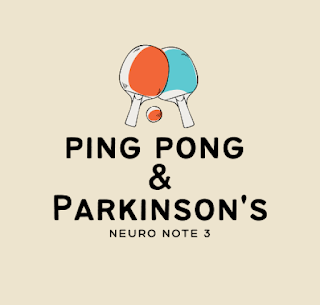Neuro Note 3: Ping Pong & Parkinson's
In our Neuro Aspects course, we recently went over the neurological disorder Parkinson's Disease. I have always had an interest in this disorder since I shadowed my first Occupational Therapist back in 2020. I had the opportunity to work with an elderly man that was more so in the middle stage of Parkinson's. He was always so kind but was also someone that was a bit hard to read. Little did I know, he had a symptom known as masked face, which means he had a set face and could not express his facial expressions. Not only did he have that, some major symptoms I noticed back then were that he had a resting tremor, bradykinesia (which is having slow movements), and a soft voice. Once we went over the main causes of symptoms in class, everything became clear to me. His case was very interesting to me because I was not familiar with Parkinson's at the time and to notice his shuffling gait and other symptoms made me curious. The Occupational Therapist I was shadowing would work on strengthening exercises and interventions that would help with his gait. With his bradykinesia and shuffling gait being huge challenges to daily life, it was remarkable to see how he would be able to step over an object in his path with ease.
To dig a little deeper into Parkinson's Disease, I read an article about a school social worker, Margie Alley, who was diagnosed with Parkinson's Disease at the age of 48. She was an avid tennis player and noticed her first symptom of foot cramping when she would play. After having foot surgery and noticing it was not healing, she went to get a second opinion about it. Once she mentioned she had a tremor in her hand she was sent to a neurologist who thought she could have Parkinson's. A movement disorder specialist finally diagnosed her at 48 years old with the disorder. While doing physical therapy in a basement, she found a table tennis center right above the physical therapy center. Luckily enough, the center was offering classes for people with Parkinson's Disease. Alley found a sense of feeling competent while playing ping pong because when she was playing, no one would ever question if she had Parkinson's. It was her getaway from reality and help her escape into something she loved doing before her symptoms appeared.
I found this article to be a helpful part of the learning process because it shows that people who are diagnosed with Parkinson's can still live a full and healthy life after the diagnosis. I chose this resource because it shows that Parkinson's should not be viewed as an end-all disorder and that you can work around it and find different activities to do that still reminds you of your life prior to the diagnosis. Alley went from playing tennis to finding a sport that is a little bit easier to play that accommodates her symptoms. It's all about finding what gives you that hope that you can overcome anything and still be seen as normal. Alley not only found a sense of intrinsic motivation within ping pong but also views it as a fun, therapeutic sense of exercise that uses different neuronal pathways to help delay the progression of her disorder. Acknowledging that Parkinson's is a chronic disease, learning to exercise and keeping your body healthy can help you a long way. Alley put together a short film, "Gotta Keep Going," to share her experience with the Parkinson's community and it was also played for the first time at the first-ever ITTF Parkinson's World Table Tennis Championships, which is a global event that invites over 60 players that live with this condition to compete against each other. As inspiring and memorable the event was for Margie, she had also won the Gold medal in the Women's Single Tournament. I highly recommend giving this article a read and watching the short film that was made for a better understanding of how one lives with Parkinson's.
Resources:
Bolster, M. (2021, June). Margie Alley plays ping-pong to cope with parkinson’s disease. Brain and Life Magazine. https://www.brainandlife.org/articles/playing-ping-pong-to-cope-with-parkinsons-disease/?utm_source=Informz&utm_medium=Email&utm_campaign=21+Brain+&+Life&utm_content=Parkinson%27s+Spotlight+6




Comments
Post a Comment